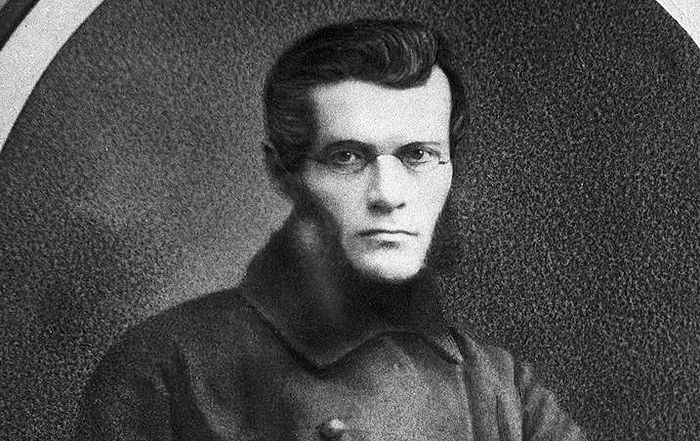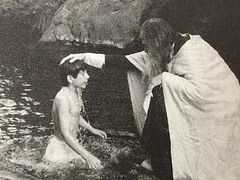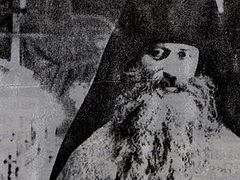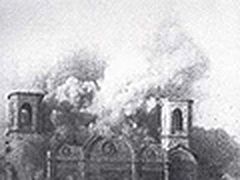A regular visitor to Optina Monastery and disciple of the Optina elders, Ivan Vasilievich Kireyevsky (March 23/April 3, 1806–June 6/24, 1856) and his wife Natalia Petrovna (born Arbenova) were also instrumental in the publication undertaken in Optina of patristic books. Today being the day of his repose, we would like to remember and introduce this important figure in Russian religious philosophy.
Ivan Kireyevsky was born to an ancient noble family of the Belev region, the son of Vasily Ivanovich Kireyevsky and Avdotia Petrovich, born Yushkova.
He studied philosophy with the German philosophers Hegel in Berlin, and Schelling in Munich; he considered Hegel to be a rationalist and follower of Aristotle, as the last and highest of all possible heights of Western thought, which should be contrasted to the Russian worldview built upon their pure, Orthodox faith.
Kireyevsky was champion of the Slavophile movement and representative of its philosophy. He saw the European departure from religious principles and loss of spiritual integrity as the source of the crisis in European enlightenment. He considered the calling of Russia’s distinctive philosophy to be the re-working of the foremost Western philosophies in the spirit of Eastern patristic teaching. Kireyevsky’s first works were published in 1861, in two volumes.
Philosophical ideas
For Kireyevsky, the idea of the integrity of spiritual life was central to philosophy. It is precisely “integral thinking” that allows the individual and society to avoid the false choice between ignorance, which leads to “inclination of the mind and heart away from true convictions,” and logical thinking, which is capable of drawing a person away from all that is important in this world. The second danger for modern man if he does not attain to integrity of consciousness is especially relevant, as Kireyevsky supposed—for the cult of the body and the cult of materialism, having received justification in rational philosophy, leads to man’s spiritual enslavement. The situation can be fundamentally changed only by “basic convictions,” “a change in the spirit and direction of philosophy.” Like Khomyakov in his teaching on conciliarity, Kireyevsky connected the birth of new thought not with the building of systems, but with a general reversal in societal awareness, “the bringing up of society”. As part of this process, through common (“conciliar”) and not individual intellectual efforts, a new philosophy that overcomes rationalism should enter into society. The essence of this path is the striving toward a concentrated wholeness of spirit, which is given by faith alone: “through the awareness of the relationship between human personality and the Person of the Divinity.” This should also be aided by ascecis—a necessary element not only of life but also of philosophy. At the same time, Kireyevsky by no means considered the experience of European philosophical rationalism meaningless. “All the false conclusions of rational thought depend only upon its claims to higher truth that is filled with knowledge.”
Translated from Azbuka.ru
On the mind of faith
by Ivan Vasilievich Kireyevsky
The word, as the transparent body of the spirit, should correspond to all of the spirit’s movements. Therefore the word should continually change its color, according to the continually changing cohesion and resolution of thoughts. In its modulation of meaning, every inbreathing of the mind should tremble and respond. It should breathe the freedom of inner life. Therefore the word that is ossified in elementary school formulas cannot express the spirit, just as a corpse cannot express life. However in changing its shades, its inner content must not be altered.
The essential is not accessible to abstract thinking alone. Only what is essential can touch the essential. Abstract thinking has to do only with the boundaries and relationships of understanding. The laws of reason and matter that make up its content have no essentialness in and of themselves, but are only the aggregate of relationships. For essential to the world is only the thinking, free personality. Only it [the thinking, free personality] has distinctive meaning. All the rest has only relative meaning. But for rational thought, a living personality would disintegrate into abstract laws of self-development, or become the product of outside principles—and in both cases it loses its true meaning.
Therefore, when abstract thinking touches subjects of faith, it can be outwardly very similar to the teachings [of faith]; in its essence however it has a completely different meaning, precisely because it lacks the sense of the essential, which springs from the inner development of the integral personality’s significance.
In quite a few systems of rational philosophy we see that the dogmas of the unity of the Godhead, of His omnipotence, His wisdom, His spirituality and omnipresence, even of His Trinitarian nature are possible and accessible to the mind of a person without faith. Such a person can even allow and explain all miracles accepted with faith, rolling them under some special formula. But none of this has any religious meaning, only because the consciousness of the living Person of the Godhead and of its living relationship to man’s personality is unfathomable to rational thinking.
The consciousness of the relationship of the living Divine Person with human personality serves as the foundation for faith; or more correctly, faith is that same consciousness, more or less clear, more or less direct. It does not comprise purely human knowledge; it does not comprise a particular concept in the mind or heart, it does not fit into the capability of gaining knowledge alone, does not relate to the logical mind alone, or the feeling of the heart, or the suggestion of the conscience. Rather it embraces the entire totality of man, and appears only during minutes of this totality, to the measure of its [that totality’s] fullness. Therefore the main character of the mind of faith consists in the striving to gather all the separate parts of the soul into one power; to search out that inner concentration of being, where mind, and will, and feeling, and conscience, and the beautiful, the true, the wondrous, the desired, the just, the merciful, and the whole content of the mind is mingled into one living unity—and in this way restores the existence of man’s personality to its original indivisibility.
It is not the form of thought standing before the mind that produces in it this concentration of powers; rather, from mental integrity comes that thought which provides true understanding of thought.
This striving for mental integrity, as the necessary condition for understanding higher truth, has always inseparably belonged to Christian love of wisdom.
From apostolic times to our times it has been its exclusive quality. But ever since the falling away of the Western Church it has remained almost entirely in the Orthodox Church. Although other Christian confessions do not [at least at the time this was written.—O.C.] deny its lawfulness, neither do they consider it a necessary condition for understanding divine truth. In the opinion of Roman theologians and philosophers, it was apparently sufficient for the authority of divine truths to have been accepted once in order for the further understanding and development of these truths to be perfected by means of abstract, logical thinking. Perhaps through a particular passionate attachment to Aristotle, their theological works bear the character of logical expositions. The very thought processes themselves took place in the form of external conceptual weaving.
Out of the dogmas of faith they sought to make logical justifications. In this logical exposition, from their abstract, rational understanding of dogmas and also as abstract conclusions, moral demands were born. Strange would be the birth of the living from the dead! An odd demand of power in the name of a thought that doesn’t have power itself!
Separate from other powers of knowledge, logical thought comprises the natural character of a mind that has fallen from its integrity. The whole order of things that come as a consequence of this bifurcated state of man draws man’s thoughts within it to this logical separateness. Faith surpasses natural reason precisely because natural reason has fallen beneath its original, natural level.
It is not possible, or necessary, for everyone to study theology; not everyone is able to occupy himself with the love of wisdom; it not possible for everyone to have that constant and particular exercise of inner attention, which purifies and gathers the mind up to a higher unity. But it is possible and necessary for everyone to bind the direction of their lives with their fundamental conviction of faith, to bring their main occupation and every separate deed into agreement with it, so that every action might be an expression of one striving, every thought might seek one foundation, every step might lead to one goal. Without this, man’s life cannot have any meaning; his mind will be no more than a counting machine, and his heart a collection of soulless strings through which chance winds whistle. No action will have any moral character, and in fact he won’t be a man. For man is his faith.
And there is no such undeveloped consciousness as cannot have the strength to permeate itself with the fundamental convictions of the Christian faith. For there is no such dull mind as could not understand its own insignificance and need for higher revelation; there is no such limited heart as could not understand the possibility of another love, higher than the one that earthly objects arouse in it; there is no such conscience as could not sense the invisible existence of a higher moral order; there is no will so weak as could not resolve itself to total self-sacrifice for the sake of its heart’s higher love. And it is from these powers that faith is formed. It is the living requirement of redemption and unconditional gratitude for it. Its entire essence is in this. From this does the mind of faith and life receives its light, meaning, and all of its subsequent development.
Translated from Azbuka. ru





